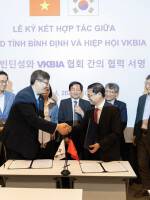
With the right policies and strategies, Viet Nam can integrate decarbonization efforts to advance development without impeding GDP growth, said Country Director of the World Bank (WB) in Viet Nam Carolyn Turk.
In her recent interview with the VGP, Carolyn Turk said, the WB welcomes the ambitious commitments made by the Governments of Viet Nam at COP26, which were accompanied by an increased ambition of the Nationally Determined Contributions (NDCs) and greener sector plans.
Viet Nam committed to achieving net zero emissions by 2050 and coal phase-out by the 2040s in Glasgow. In 2022, the NDC was updated to align with the net-zero commitments increasing the unconditional emission reduction targets from 9 to 15.8 percent, and conditional from 27 to 43.5 percent, she noted.
According to the WB Country Director, the Viet Nam Country Climate and Development Report is a pioneering initiative featuring with two crucial development pathways: resilience and decarbonization.
These pathways aim to align the country’s development goals with escalating climate risks. The report estimates that achieving a climate-resilient, net-zero emissions trajectory requires an additional investment of around 6.8 percent of GDP, totaling US$368 billion by 2040.
The report underscores the need for reinforced government commitments, complemented by active engagement from the domestic private sector and external financial support.
Besides, the WB has earlier issued an Emission Reduction Linked Bond worth US$50 million for Viet Nam, provided US$41 million under the Emission Reduction Payment Agreement, and helped a local commercial bank to issue green bonds worth up to US$100 million. These efforts reflect the WB’s commitment to support Viet Nam with climate financing through different instruments.
Power Development Plan 8-turining point for power sector
The power sector alone is responsible for about 40 percent of total emissions due to reliance on coal-based generation.
Carolyn Turk hailed the recently approved Power Development Plan 8, which changes the historical trajectory of the sector by halving targets for coal installed capacity (from 55GW to 30GW) and more than doubling the target for renewables (from 21GW to 50GW) by 2030.
Viet Nam has signed up for the Just Energy Transition Partnership (JETP) initiative.
In the energy sector, the WB is actively working with development partners in support of the country’s clean energy transition and infrastructure climate resilience efforts.
In 2020-2022 the WB provided over US$5 million in technical assistance, responding to the client’s priority needs and avoiding duplication of efforts.
The WB co-chairs with Ministry of Industry and Trade and the European Union the Viet Nam Energy Partnership Group (VEPG), the Government-led donor coordination platform tasked to identify key enablers for the next phase of growth of the sector.
Furthermore, the bank has also been a technical partner for the JETP initiative.
Enhancing low-carbon agriculture in Viet Nam
The WB Country Director said, Viet Nam’s agriculture sector contributes about 12 percent of the GDP and employs about 30 percent of the labor force in 2022. But it also contributes around 19 percent of total greenhouse gases, of which, rice sector contributes about 48 percent.
The WB has worked very closely with the Ministry of Agriculture and Rural Development (MARD) in conceptualizing and developing the “one million hectares high quality and low-carbon rice program”.
She expressed her delight that the program has just been approved by the Prime Minister, adding that the bank is committed to supporting the program through both financial resources as well as global knowledge.
In addition, the bank is currently preparing a Mekong Delta Climate Resilience and Integrated Transformation Project (MERIT) working with MARD and 10 other provinces in the Mekong Delta.
The project represents a well-thought evolution of the WB’s long-term engagement in the Mekong Delta, with multiple on-going and future projects envisaged to contribute to the Mekong Delta Regional Master Plan.
The long-term engagement is intended to provide critical resources and a strategic framework to operationalize the vision and priorities laid out in the master plan and address current and future climate change impacts.
The framework will help to build mechanisms and tools for regional coordination, further enhance the capacities for data and information collection and analysis and support the development of policies and modalities for climate-resilient decision-making among institutions (public and private) and across different stakeholders.
Increasing financial attractiveness of investment in renewable energy
The transport sector contributes about 10.8 percent of the total CO2 emissions as of 2019. In a business-as-usual scenario, these emissions are projected to grow at an annual rate of 6-7 percent to nearly 70 million tons CO2 emissions.
In this sector, the WB has been a long-term partner of the Ministry of Transport for the promotion of inland waterway transport, which emits one-sixth of trucks for freight transport.
The next phase of the engagement is through Southern Waterways Logistics Corridor Project, a project to reduce travel time on waterways between Ho Chi Minh City and Can Tho, and the project is at an advanced stage of preparation.
Cities in Viet Nam account for between 70-75 percent of scope 1 and 2 emissions in the country, with concentrations in Ho Chi Minh City and Ha Noi, home to over a third of the national population.
To increase the financial attractiveness of the investment in renewable energy, energy efficiency and electric vehicles, the National Assembly has approved Resolution 98 which allows Ho Chi Minh City to create high-quality carbon credits to be sold in the international market.
The city has developed a carbon crediting scheme that will soon be operationalized in parallel to a low-carbon city project under preparation.
“We have estimated US$750 million in public and private investments to reduce 22 million tons of carbon over 10 years, and we believe this project can be replicated across the other large cities in Viet Nam”, shared the WB Country Director.
(VGP)




